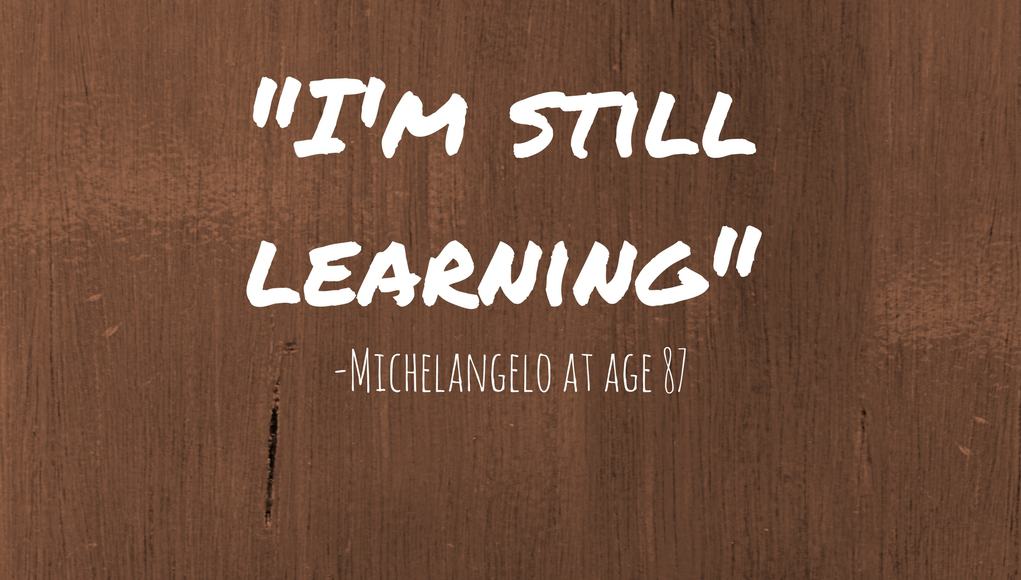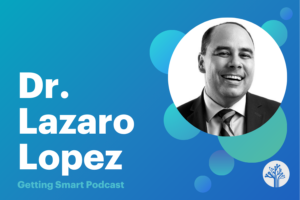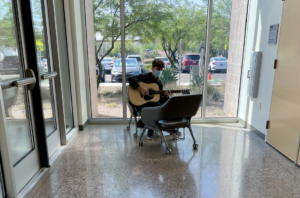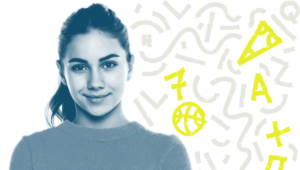10 Reasons Why Lifelong Learning is the Only Option

By Caroline Vander Ark & Mary Ryerse
Whether you carry a “love of learning” torch or tend toward a “learn or die” mentality, lifelong learning is really the only option.
Plenty of respected leaders ranging from Michelangelo to Eleanor Roosevelt to Gandhi—not to mention countless devoted classroom teachers—have spoken about the importance of fostering a love of learning and of the ongoing growth of individuals.
In his book Learn or Die, Edward Hess cites today’s increasing globalization and rapidly evolving technologies as reasons that individuals and organizations must maximize their ability to learn, since learning is the foundation for continuous improvement, operational excellence and innovation.
10 Reasons for Lifelong Learning
Regardless of which seems most compelling to you, there are lots of reasons for lifelong learning, along with resources and tips to support you on your journey.
1. Skill Up (Functionality). At home and at work, in order to function effectively day-to-day amidst a rapidly changing world, we need to learn new things. Period. Whether it be learning to use a new phone, a new app, or a new process at work, building skills is a constant in an ever-changing world. The new movie Hidden Figures paints the picture of how several women working for NASA in the 60’s saw innovation replacing their current roles and used both formal and informal learning methods to skill up and remain valuable. Our recent podcast featuring David Rattray discusses skilling up and the need to adapt to a new economy and a changing world.
2. Purpose and Path. One term that has been used over the past couple decades when addressing purpose and path is “college and career readiness.” As groups like the School Superintendents Association (AASA) have taken another look at what readiness means, they’ve expanded readiness to include the concept of life ready.

This concept of life readiness refers to the development of perseverance, a growth mindset (at its core, a belief that we can all continue to learn and grow throughout our lives) and other social-emotional skills. Likewise, college and career readiness guru David Conley and the team at EPIC Education Policy Improvement Center have added lifelong learning as a must.
3. Passions and Life Satisfaction. Pursuing passions and interests outside of work (where you might have already done a lot of learning, or feel saturated) is important. Check out more through the Generation Do-it-Yourself (Gen-DIY) campaign, which focuses on how this generation is creating new pathways through education into careers they love.
4. Employability. Today, the average person changes jobs ten to fifteen times during their career. Some cite even higher numbers. Both learners and learning providers are adapting accordingly. For example, Amazon is joining in the skill-up business, having launched re:Start, a UK training and job placement program to educate young adults as well as military families on the latest software development and cloud computing technologies. University Ventures also speaks to the important role of local entities including community colleges to focus on job placement.
5. Economic Imperative. Closely related to employability, according to a recent article in The Economist, learning is becoming an economic imperative. Technological change demands stronger and more continuous connections between education and employment. The ROI between education and employer is not as linear as it once was.
6. Leadership. Tesla CEO Elon Musk, who has mastered industries as diverse as software, energy, transportation and aerospace, shares 3 “secrets” that power his leadership:
- Become an ‘expert-generalist’
- Improve your ‘learning transfer’ skills, and
- View knowledge as a ‘semantic tree.’
7. Transferability. Consistent with Musk’s perspective and AASA’s emphasis on college, career and life readiness, College Spark Washington—a private foundation supporting education initiatives such as the College Readiness Initiative—has invested in impacting life opportunities for young people. Program Officer Heather Gingerich says, “We’ve gotten way more interested in how effective instructional strategies help students become ‘learners’ in ways that extend beyond any one particular class or point in time.”
8. Social Awareness and Perspective. In order to truly empathize with others, increase social awareness and build relationships, we must intentionally seek out ideas that differ from our own. This is critical not only to the health of individual relationships, but also the health of society.
9. Practicality. We live in an era where you can fix pretty much anything in your home by watching a YouTube video. This anytime, anywhere learning has created a DIY culture that allows people interested in everything from home improvements to crafting to cooking to learn practical skills that they may have otherwise hired out for.
10. Longevity. We’ve all heard the stories of people who have actively learned their entire lives living longer. Health research has pointed to lifelong learning as one of the best ways for seniors to stay healthy. An active mind throughout your life has been proven to help you live longer and healthier.
Types of Lifelong Learning
While there is a wide range of reasons to engage in lifelong learning, there are also many types. These fall along a spectrum of informal to formal learning opportunities.
- Formal. Formal lifelong learning often takes place as part of a scheduled and monitored sequence of learning such as college courses. This type of learning is not done on demand and usually follows a set schedule with a cohort of learners.
- Self-directed. When students have control over the path and pace of learning it may be known as self-directed. Examples of this in lifelong learning may include online courses that can be taken on demand when your schedule permits, like MOOCs. This may also include YouTube workshops that are sequenced but self-paced.
- Professional. One of the most common types of lifelong learning happens at work through professional development, job training or skill acquisition, and it is usually tied to career passion. Learning on the job, both formally and informally, is a primary way of lifelong learning. Some companies like Google and Microsoft allow employees to spend up to 20% of their week on projects and interests that are not directly related to their current role. This type of learning ties together professional and personal lifelong learning.
- Personal. This type of lifelong learning is usually done outside of the workplace, and is often tied to a passion or interest. Individuals may pursue this learning informally or formally.
- Indirectly. Some lifelong learning happens without you even planning or knowing about it. Through conversations, unexpected lessons learned, relationships or travel, the world around you may expose you to new ideas and learning than you had even planned for.
- Informal. At the opposite end of the spectrum from formal learning is informal learning. Individuals may choose to learn through reading, watching YouTube, from a peer, or by trial and error. The ways to learn informally today are endless.
Given these many types of learning—along with rapidly changing technology, disrupted work and learning environments, the emphasis on individual learning plans, micro-credentials, and more—one key question is who will own the lifelong learning relationship. According to Udemy president Dennis Yang, it will differ by sector based on several factors.
Resources
Regardless of where you want to start or what type of learning you’d like to engage in, the sources for supporting learning are limitless. Here are a few places to get started:
- Daily life (community, kids, work, etc.)
- The people around you—ask questions. All the time.
- Places (museums, parks, nature, literally anywhere)
- Internet (you can access pretty much anything through a Google search)
- Literature and books
- Online classes and videos such as Lynda.com, YouTube
- Universities and Community Colleges
- Apprenticeships and internships
- Certification and training programs
Tips to Get Started
Our team has spent the past few months pushing each other to focus both formally and informally on lifelong learning. Through conversations and other resources, we’ve compiled this list of tips to always be learning:
- Become open to the possibilities around you
- Increase awareness about what is of interest to you
- Start small and build from there
- Don’t be afraid to fail
- Model after others (see The Mission)
- Read more on developing self-directed learners
- Listen to a series of TED Talks on lifelong learning
- Ask more, speak less
We would love to hear your ideas! Feel free to add your favorite reasons, resources and tips for getting started with lifelong learning via social media or in the comments section below.
For more, see:
- LinkedIn Launches Learning Portal with Biz, Tech & Creative Pathways
- Out of the Classroom, Of the Campus and Into the Community
- Power Life-Long Learning Relationships
Stay in-the-know with all things EdTech and innovations in learning by signing up to receive the weekly Smart Update. This post includes mentions of a Getting Smart partner. For a full list of partners, affiliate organizations and all other disclosures, please see our Partner page.








John Sutherland
This is a wonderfully written article and makes the case for the importance of lifelong learning. After teaching seniors the last couple of years in lifelong learning classes I can attest to the enthusiasm and dedication that they bring to the table. It is essential that we learn at all stages of life .
Dr. Suhasini Uttam Jadhav
Thanks for the good information. I really appreciate it. As a teacher and a Life long learner , the article is quite supportive. I would like to share with my students.
Avneet Oberoi
That article was really thorough and it hits just right. Learning should go on forever. We at Kool Stories understand this need for learning and bring together people from worldwide to learn and share their skills. Our upcoming digital learning platform https://www.koolstories.com/ is the change. Check us out!
Thanindra Virarusme
Thanks for sharing, It's meaningful for Life Long Learning mindset for the better future!